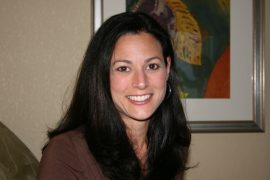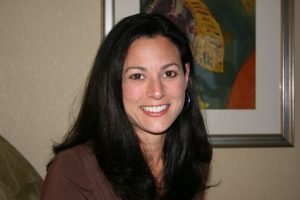For many of us, math is like hearing — something we take for granted on a daily basis. As an audiologist, Julie Norin pays close attention to both on a day-to-day basis. Here’s how she uses math in her work and what she thinks of it.
What do you do for your living?
I work as a clinical audiologist which means I help people who have hearing loss and other related ear problems. Essentially, I measure a patient’s ability to hear and distinguish between sounds. After analyzing the test results along with other medical data, I make a diagnosis and determine a course of treatment. Most often, the course of treatment involves fitting a patient with hearing aids, which I then program according to their hearing needs, but I may also refer my patients for continued medical care by their primary care physician, an ear, nose, and throat physician, a cochlear implant specialist, or a neurologist. I also spend a great deal of time counseling my patients and the family members of my patients regarding the diagnosis of hearing loss and treatment plan.
When do you use basic math in your job?
I use basic math daily. When testing a patient, I use simple addition and subtraction to determine differences between the ears, as well as to determine the presentation levels of the various test signals. When testing a patient’s speech discrimination abilities, I use division and calculate percentages, and with other tests I rely on a formula of ratios and statistics to determine whether results are normal or not. I also make buying decisions for the clinic where I work. I use math to calculate clinic expense and net revenue. Our clinic provides a sliding-scale reduced fee, which is based on a person’s financial standing. This can vary between a 20% and 80% discount, so I am always applying basic math to calculate those patients’ fees.
Do you use any technology to help with this math?
My diagnostic equipment is computerized and has some technology built in, so the math can be calculated during speech discrimination testing, as long as I am tracking patient responses using the computer. But every so often, I wind up doing the caluclations myself. Hearing aids are typically programmed using a designated fitting formula, which is calculated based on age, size of the ear canal and degree of hearing loss. In terms of factoring clinic expenses and net revenue, I will pretty much always rely on a calculator if there is one close by. I like to be absolutely sure about the numbers. Especially since I work for a non-profit agency.
How do you think math helps you do your job better?
I wouldn’t be able to do my job if I didn’t have an understanding of math, especially when I’m testing, because the equipment is not able to determine differences between the ears or calculate presentation levels. It also helps me to understand test results, and determine what instruments are suitable to accomodate a patient’s needs.
How comfortable with math do you feel?
I have never really felt comfortable with math. I still don’t. Hearing science and the study of acoustics are both incredibly math based, so during my studies I had to learn how to do complicated algebra and logarithic equations, which I had never understood. I was fortunate to have the most amazing professor when I went back to earn my second bachelor’s before pursing my doctorate in audiology. I could not have made it through without her.
What kind of math did you take in high school?
I actually made it all the way to 7th grade before my teacher at the time recognized that I did not know how to do long division or fractions. I could usually solve the equations, but I had my own bizarre way of doing it. By the end of that year, I was able to do the math correctly, but I never considered myself a strong math student. I remember taking algebra, geometry, and trigonometry in high school, but I know I never really learned or understood any of it. I’m not sure how I managed to pass any of those classes. I remember taking a basic math class my first semester of college and being so glad that would be the last math class I would ever have to take. Little did I know I would go back to school years later and wind up doing more math than ever.
I still have a recurring nightmare about that college math class I took as a freshman. It’s the end of the semester, time for the final exam, and either I never went to the class or I did, but never learned anything, and now I have to take the exam!
Did you have to learn new skills in order to do the math you do at work?
I don’t think I had to learn new skills for the math I use day to day, but I definitely had to learn new skills in order to get through my grad school programs. I feel much more confident about my skills now than I did back in high school. Especially when it comes to algebra. I actually enjoy it, now that I know how to do it.
Thanks so much to Julie for visitin Math for Grownups today. If you have questions for her, ask them in the comments section

